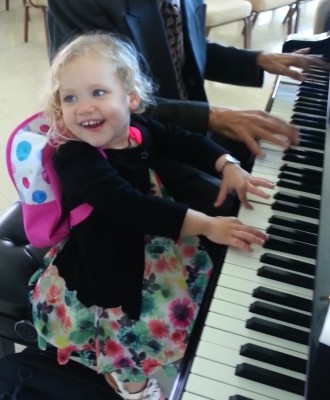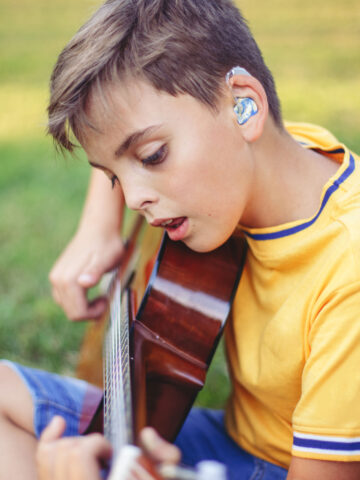Penelope Grand had normal hearing from the day she was born. She loved to dance to music and she was easily woken by noises. Her parents, Luci and Paul, anxiously awaited her first word. Then, when she was about 10 months old, something changed.
“We really knew there was something wrong when I went to get her out of her crib after her nap one day,” mom Luci says. “She was calling out and fussing, she wanted out of there, and I came into the room but she wasn’t facing the door. I stood right in front of her crib and I called out her name, I clapped, but I got no response from her.”
Genetics are the cause of roughly half the cases of prelingual deafness, even when symptoms don’t appear at birth, as in Penelope’s case. Hearing tests and an auditory brainstem response (ABR) test revealed that Penelope had developed profound hearing loss in both ears. She had become essentially deaf.
“We were devastated,” Luci says. “I was preparing to hear ‘mild to moderate,’ not ‘profound.’ The air sucked out of my lungs. I wondered why. She is so sweet and loving, why did she have to lose her hearing?”

Penelope’s audiologist prescribed hearing aids, but she had no benefit from them. That made her an ideal candidate for a cochlear implant, a new treatment offered at CHOC in close partnership with Providence Speech and Hearing Center. A cochlear implant is a small electronic device that is surgically implanted under the skin behind the ear, and has an electrode that extends into the cochlea in the inner ear. The implant’s electrode directly stimulates the cochlear nerves that perceive sound.
Dr. Nguyen Pham, CHOC pediatric otolaryngologist and head and neck surgeon, performed two outpatient surgeries on Penelope to place a cochlear implant on each of her ears.
“A cochlear implant can be life-changing for a child,” Dr. Pham says. “Children who would have been in the deaf community are now joining the hearing community because of cochlear implants. It is essentially restoring nearly normal hearing in these children.”
A Sense of Sound Restored
Oct. 13, 2015, was a memorable day for the Grands. That’s the day Penelope’s cochlear implant was activated, amidst her family and a crowd of supporters from CHOC and Providence.
Penelope begins to hear at 0:06.
“The first moment we knew she could hear was, well, it’s hard to describe what that felt like: joy, pride, happiness, excitement,” Luci says. “The look on her face was beautiful. We must have rewatched that video a hundred times.”
A cochlear implant does not translate sound perfectly. Those who wear an implant hear sounds with a robotic, mechanical quality. Following the implant’s activation, Penelope’s team of audiologists at Providence fine-tuned the frequencies of the electrodes—a process called mapping—until they produced the optimal sounds for her ears.
Now, she is undergoing comprehensive speech and language therapy, a crucial step in helping her interpret the sounds she hears and learn to communicate. She also uses American Sign Language.
“We are in awe of her, how much she’s already progressed,” Luci says. “She responds to her name now when we call out to her. She finally said her first word, bye bye, and she can now say mom. She has begun to dance again. She also has started singing in the car with me along to the music. We realized that she is so smart and so very happy, and her potential is endless. We are happy and grateful every day that she had this opportunity.”
Learn more about the CHOC Cochlear Implant Program.
The Cochlear Implant Program is generously supported by Wildcard Army, in memory of Nixon Wildcard Hunter.
Get more expert health advice delivered to your inbox monthly by subscribing to the KidsHealth newsletter here.
Learn more about CHOC’s otolaryngology program
At CHOC, our pediatric otolaryngologists provide comprehensive care for children of all ages – from newborns to teens – with conditions of the ears, nose, throat (ENT).





